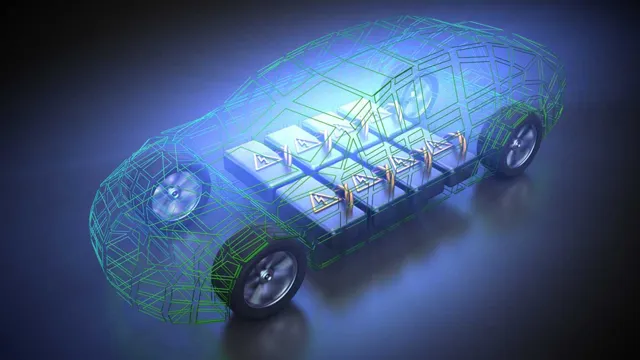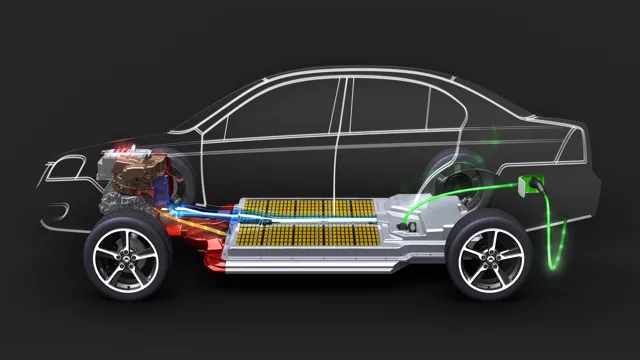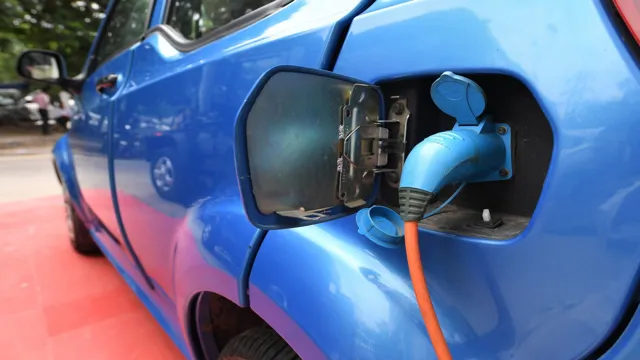The Shocking Truth: Unveiling the Real Cost of Battery for Electric Cars
Electric cars are gaining popularity and becoming more affordable than ever before. But have you ever wondered about the cost of the batteries that power these vehicles? It’s no secret that battery technology is one of the most important factors in the production of electric cars. After all, these batteries are responsible for storing enough energy to power the entire vehicle.
As the demand for electric cars increases, so does the need for advanced battery technology. But what exactly does it cost to produce an electric car battery, and how does this affect the overall price of the vehicle? In this blog, we’ll take a closer look at the cost of electric car batteries and what factors contribute to their production. By the end of this article, you’ll have a better understanding of the expenses involved in electric car production and what the future may hold for this innovative technology.
Overview of Battery Costs
The cost of batteries for electric cars has been one of the biggest obstacles to widespread EV adoption. It is no secret that battery technology remains a major challenge and a major contributor to the high costs of electric cars. However, over the last decade, battery costs have fallen significantly, making electric cars more affordable.
The price of lithium-ion batteries, which are the most widely used type of battery in electric cars, has fallen by more than 70% from 2010 to 201 Technological advancements and increased manufacturing capacity have played a significant role in driving down the cost of batteries. As demand for electric cars continues to grow, we can expect battery prices to continue to drop, making them more accessible to average consumers.
Although there are still challenges to be addressed with regards to battery costs, the trend is certainly a positive one.
Current State of Battery Pricing
Battery costs have seen a significant decline over the years, thanks to advancements in technology and increasing demand. Currently, the average cost of a lithium-ion battery pack is around $137/kWh, which is a substantial drop from $1,100/kWh in 20 With further developments in battery technology, experts predict that costs could fall below $100/kWh in the near future.
The decline in costs has made electric vehicles (EVs) more cost-competitive with traditional gasoline-powered cars. Additionally, renewable energy sources like solar and wind power are becoming more accessible to households and organizations as battery storage becomes more affordable. This is a positive step forward in the transition towards clean energy, and it’s encouraging to see that costs are continuing to decline.
With the continued downward trend, we can expect to see more widespread adoption of EVs and renewable energy sources in the coming years.
Factors Affecting Battery Costs
Battery costs are a significant factor when it comes to the production and cost of electric vehicles. The cost of batteries comprises a considerable share of the total price of an electric vehicle. Several factors affect the cost of batteries.
One of the most essential factors is the raw materials used in the production of batteries. The quantity and cost of raw materials used in the production of batteries, such as cobalt, lithium, and nickel, have a significant impact on the cost of batteries. Other factors that affect the cost of batteries include the complexity of manufacturing processes, the size of the battery, and the level of competition in the market.
As the demand for electric vehicles increases, it is expected that there will be a reduction in battery costs due to economies of scale and advances in technology.
Examples of Electric Car Batteries and Their Costs
When it comes to buying an electric car, a major factor to consider is the cost of the battery. The cost of an electric car battery can vary widely depending on the make and model of the vehicle. For example, a Tesla Model S battery can cost upwards of $12,000.
However, the cost of electric car batteries is decreasing rapidly as technology advances, making electric cars more affordable for consumers. Batteries for popular electric cars such as the Nissan Leaf and Chevy Bolt cost around $5,000 to $7,000, while the cost of a battery for a Hyundai Kona Electric or Kia Niro EV is around $8,000 to $10,000. The costs of a battery replacement for your electric car may not seem cheap, but in the long run, electric cars are still more economical due to lower fuel and maintenance costs.
Tesla Model S Battery Cost
Electric Car Batteries Electric car batteries are a key component of electric vehicles, and they are growing in popularity as more people switch to clean energy solutions. The Tesla Model S battery is one of the most popular electric car batteries on the market. The cost of the Tesla Model S battery is around $15,000.
This is a significant investment, but it is important to note that electric car batteries typically last longer than traditional gasoline-powered cars. Other examples of electric car batteries include the Nissan Leaf battery, which costs around $5,500, and the Chevrolet Bolt battery, which costs around $15,000. It is important to research the cost and lifespan of different electric car batteries before making a purchase.
With so many options available, it is possible to find an electric car battery that meets your needs and budget.
Nissan Leaf Battery Cost
The Nissan Leaf has been a popular electric car for years, and one of the most significant factors in its success has been its battery cost. The Leaf’s battery pack has always been competitively priced, with the latest generation offering an estimated cost of around $5,500. However, when it comes to electric car batteries, the Nissan Leaf is just the tip of the iceberg.
Other popular electric cars such as the Tesla Model S, Chevy Bolt, and Hyundai Kona Electric all have their battery costs, which can range from $7,000 to over $14,000. These costs may seem steep, but they are decreasing every year as technology improves and economies of scale take effect. As more people switch to electric cars and battery production ramps up, it’s likely that electric car batteries will become even more affordable in the future.
Chevy Bolt Battery Cost
Chevy Bolt Battery Cost One of the most significant factors holding people back from buying an electric car is the cost of the battery. However, the prices have been decreasing, and many people are looking for examples of electric car batteries and their costs. For instance, the Chevy Bolt battery cost has been reduced from around $15,000 to $8,000 in recent years.
This price reduction shows the potential of battery manufacturing getting more efficient and affordable. Another example is the Tesla Model S battery, which costs around $12,000. This amount might still seem expensive, but it is crucial to note that the battery can last for eight to ten years or even longer, making it worth the investment.
Moreover, the cost of electric car batteries is dropping incredibly fast, and some experts predict that these prices will plummet by up to 50% or more in the next few years. In summary, the Chevy Bolt battery cost and other examples have shown that the expenses of electric car batteries are getting more affordable, and it is only a matter of time before they become the norm.
Comparison of Battery Costs vs Gasoline
As electric cars continue to grow in popularity, the cost of batteries for these vehicles is a concern for many potential buyers. While the initial cost of an electric car may be higher than a gasoline-powered vehicle, it’s important to consider the long-term savings on fuel costs. According to a recent study, the cost of owning an electric car over a five-year period is approximately $13,000 less than a gasoline car.
Additionally, the cost of battery production has decreased significantly in recent years, making electric cars more affordable and accessible to the average consumer. Some experts even predict that the cost of batteries for electric cars could fall below the cost of gasoline in the near future. While there are certainly challenges to adopting electric cars, the cost of batteries is not as prohibitive as it once was.
Cost/Benefit Analysis: Electric vs Gas Cars
When it comes to comparing the costs of electric cars versus gasoline cars, one of the most significant factors to consider is the cost of the batteries. While electric cars may have higher upfront costs, the cost of running and maintaining them over time is significantly lower. The average gasoline car owner spends around $1,500 annually on fuel costs alone, while an electric car owner spends closer to $500.
Additionally, electric cars require less maintenance than gasoline cars, as they have fewer moving parts and don’t require oil changes. And even when the battery needs to be replaced after several years, the cost of a new battery is only a fraction of the cost of a new gasoline engine. In the long term, switching to an electric car can save you a significant amount of money.
ROI Analysis for Installing Solar/Battery Combo
When it comes to the cost of batteries versus gasoline, it’s clear that batteries have a higher upfront cost but can ultimately yield greater long-term savings. The initial investment of installing a solar/battery combo may seem daunting, but let’s consider the potential return on investment (ROI). With advancements in technology, the shelf life and performance output of batteries have improved significantly.
And with solar power, you have a consistent and renewable energy source. On the other hand, gasoline prices are volatile and can rise unexpectedly. Plus, you’ll need to continuously pay for fuel to power your vehicle.
Over a 10-year period, the cost of gasoline alone could easily surpass the cost of installing a solar/battery combo. Additionally, the solar/battery combo can provide energy independence and can also potentially increase the value of your property. By making the switch to solar and batteries, you’re investing in both your wallet and the planet.
Future of Electric Car Batteries
As electric vehicles continue to gain popularity, the cost of battery for electric cars is a major area of concern. The high cost of electric car batteries is considered to be one of the main reasons why electric cars are still more expensive than traditional gasoline-powered vehicles. However, as research and development in the field of electric car batteries continue to progress, industry experts predict that the cost of batteries will gradually decrease.
Additionally, the advancements in battery technology will likely lead to longer battery life, making electric cars even more practical for everyday use. While the costs may still be high in the short term, the potential of electric car batteries to revolutionize the automotive industry and provide more environmentally friendly transportation options is a promising prospect. As the technology continues to evolve, we can look forward to more affordable and efficient electric vehicles in the future.
Predictions for Battery Costs in Coming Years
The future of electric car batteries looks promising, with the cost of the batteries expected to see a significant reduction in the coming years. According to industry experts, the cost of electric vehicle batteries has decreased by 89% in the last ten years. This trend is expected to continue, and by 2030, the cost of electric vehicle batteries is expected to fall to under $100 per kilowatt-hour.
This is good news for car manufacturers, as it means that electric cars will be more affordable and accessible to consumers, making it easier for them to make the switch to electric. With increased adoption of electric vehicles, we can reduce our dependence on fossil fuels, thus contributing to a cleaner and more sustainable future.
Emerging Technologies and Their Potential Impact
Electric car batteries have come a long way in recent years, but the future of these batteries is even more promising. Emerging technologies in the field of electric car batteries are set to revolutionize the industry, making electric cars more efficient, affordable, and eco-friendly than ever before. One of the most exciting developments is the use of solid-state batteries, which replace the liquid electrolyte in traditional lithium-ion batteries with a solid electrolyte.
These batteries have the potential to offer higher energy density, longer driving ranges, and faster charging times than current lithium-ion batteries. Additionally, researchers are exploring the use of alternative materials, such as sodium and magnesium, which may be more abundant and cheaper than traditional lithium-ion materials. With these advancements in electric car battery technology, we can look forward to a future where electric cars are the norm rather than the exception.
Conclusion
In conclusion, the cost of batteries for electric cars may seem daunting at first glance, but as technology evolves and production efficiency improves, the prices continue to drop. Just think, the same technology that once cost over $1,000 per kilowatt-hour now costs less than $150! So while buying an electric car may require a bit of an investment upfront, it ultimately pays off in fuel savings and environmental benefits. Plus, you can’t put a price on the peace of mind that comes with reducing your carbon footprint and driving on clean energy.
So go ahead, join the electric revolution – your wallet (and the planet) will thank you!”
FAQs
What is the average cost of a battery for an electric car?
The average cost of a battery for an electric car ranges from $5,500 to $7,000.
How often do electric car batteries need to be replaced?
Electric car batteries generally last anywhere from 8 to 10 years and can travel between 100,000 to 200,000 miles before needing to be replaced.
Is it more expensive to replace an electric car battery compared to a traditional car battery?
Yes, electric car batteries are generally more expensive to replace compared to traditional car batteries due to their larger size and specialized technology.
Can the cost of an electric car battery be covered under warranty?
Yes, some electric car manufacturers offer warranties that cover the cost of battery replacement, typically ranging from 8 to 10 years or a specific number of miles driven.





